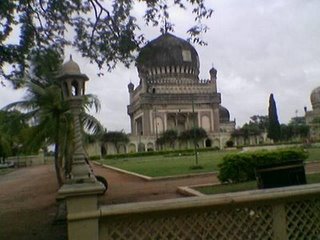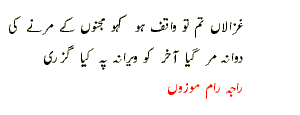Ashraf, 80, was a leading Urdu poet, who avoided popular 'mushairas' and this is perhaps the reason that he didn't get the fame which he deserved.
But his command over language and idiom, had made him one of the foremost 'shayars' of the era in the country.
shahar-dar-shahar shab-e-taar* ka pheraa hoga
[Syed Amin Ashraf]
Syed Amin Ashraf was born in Kachhauchha Sharif in UP, on June 20, 1930. A professor of English in Aligarh Muslim University (AMU), Urdu poetry was his first love. Though he began writing poetry in the decade of fifties, his first collection of poetry [divan] was published only in 2000.
This suggests how Ashraf sahab was indifferent towards publication of his own poetry.
In fact, he was the most important poet in the region. But he mostly remained confined to literary magazines and attended only select gatherings and 'mushairas'. Eminent Urdu writer Rashid Anwar Rashid recently wrote in Ajkal that, 'Only after Shaharyar's demise, Syed Amin Ashraf got recognition as the most important poet in Aligarh'.
Rashid is not off the mark. It is true that Shaharyar was a legend in his own right but his association with movies, particularly, his lyrics in Umraojan, made him a household name. Besides, Ashraf, wasn't a person who was interesting in pushing himself ahead.
Some of his couplets:
halqa-e-shaam-o-sahar se nahiin jaane walaa
dekhtaa huuN muntashir shiiraaza-e-kaar-e-jahaaN
agar hazaar baras kii bhii zindagi hotii
Ashraf sahab was aware of his literary standing. He said it it numerous couplets. In literary journal Kitabnuma, Dr Iffat Ara, wrote an obituary and she has also made a selection of his well-known 'ash'aar'.
munavvar aur mubham iste-aare dekh leta huuN
nasha-e-she'r uRaaye liye jaata hai mujhe
mauj-e-nasim ban ke ravaaN kuu-ba-kuu hue
Human beings don't get everything they wish for in life. An emotional, yet 'wazadar' person, he kept his pain to himself though it occasionally gets visible in his poetry. He did have a contended life and happy marital life. Yet, those who knew him, were aware about what he pined for and what kept him sad.
Jo milna hai vahi mil kar rahega
Amin Ashraf retired in 1990. It was only in later years that he took interest in publishing his works. Because of his command over Persian, one finds an enchanting quality in his couplets. Some of his couplets remind you of the legendary Irfan Siddiqui.
Ameen Ashraf maiN khud na-aashna lekin ye shohrat hai
koii sabab hai jo rahtaa hai Khauf-e-naadiida
ye maana aib bhii haiN saikRoN, kis meN nahiiN hote?
A couplet from the 'naat' genre:




 ,
, 


















































